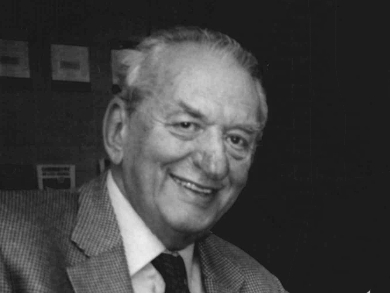Professor George A. Olah, University of Southern California, Los Angeles, USA, has passed away on March 8, 2017.
Olah received the Nobel Prize in Chemistry in 1994 “for his contribution to carbocation chemistry”. He had used non-nucleophilic superacids, such as FSO3H·SbF5, to protonate hydrocarbons and generate comparatively long-lived carbocations. This allowed the study of these important intermediates in organic chemistry.
His later work focused on the so-called “methanol economy”, where methanol and dimethyl ether are used as an alternative to fossil fuels.
George A. Olah studied chemistry at the Technical University of Budapest, Hungary. In 1957, he moved to Canada and joined Dow Chemical in Sarnia, Ontario, where he started to work on stable carbocations. In 1965, he became Professor of Chemistry at Case Western Reserve University, Cleveland, OH, USA, and in 1977, he joined the University of Southern California. There, he became Donald P. and Katherine B. Loker Distinguished Professor of Organic Chemistry and Director of the Loker Hydrocarbon Research Institute.
In addition to the Nobel Prize and many other honors, Olah received the Arthur C. Cope Award from the American Chemical Society (ACS) in 2001, the Grand Cordon of the Order of Rising Sun of Japan in 2003, and the Priestley Medal from the ACS in 2005. He was an Honorary Member of the Gesellschaft Deutscher Chemiker (GDCh, German Chemical Society), a Member of the U.S. National Academy of Sciences, and a Foreign Member of the Royal Society.
Selected Publications
- A Life of Magic Chemistry: Autobiographical Reflections Including Post-Nobel Prize Years and the Methanol Economy,
George A. Olah, Thomas Mathew,
Wiley, 2015.
ISBN: 978-1-118-84003-0 - Towards Oil Independence Through Renewable Methanol Chemistry,
George A. Olah,
Angew. Chem. Int. Ed. 2013, 52, 104–107.
DOI: 10.1002/anie.201204995 - Copper-Mediated Difluoromethylation of (Hetero)aryl Iodides and β-Styryl Halides with Tributyl(difluoromethyl)stannane,
G. K. Surya Prakash, Somesh K. Ganesh, John-Paul Jones, Aditya Kulkarni, Kamil Masood, Joseph K. Swabeck, George A. Olah,
Angew. Chem. Int. Ed. 2012, 51, 12090–12094.
DOI: 10.1002/anie.201205850 - Taming of Fluoroform: Direct Nucleophilic Trifluoromethylation of Si, B, S, and C Centers,
G. K. S. Prakash, P. V. Jog, P. T. D. Batamack, G. A. Olah,
Science 2012, 338, 1324–1327.
DOI: 10.1126/science.1227859 - Beyond Oil and Gas: The Methanol Economy,
George A. Olah, Alain Goeppert, G. K. Surya Prakash,
Wiley-VCH, Weinheim, 2011.
ISBN: 978-3-527-64463-6
Book Review by Douglas W. Stephen, Energy Technol. 2013, 1 (12), 777. DOI: 10.1002/ente.201305018 - Hypercarbon Chemistry,
George A. Olah, G. K. Surya Prakash, Robert E. Williams, Kenneth Wade, Arpad Molnar,
Wiley, 2011.
ISBN: 978-0-470-93568-2 - Anthropogenic Chemical Carbon Cycle for a Sustainable Future,
George A. Olah, G. K. Surya Prakash, Alain Goeppert,
J. Am. Chem. Soc. 2011, 133, 12881–12898.
DOI: 10.1021/ja202642y - Superacid Chemistry,
George A. Olah, G. K. Surya Prakash, Jean Sommer, Arpad Molnar,
Wiley, 2009.
ISBN: 978-0-471-59668-4 - Chemical Recycling of Carbon Dioxide to Methanol and Dimethyl Ether: From Greenhouse Gas to Renewable, Environmentally Carbon Neutral Fuels and Synthetic Hydrocarbons,
George A. Olah, Alain Goeppert, G. K. Surya Prakash,
J. Org. Chem. 2009, 74, 487–498.
DOI: 10.1021/jo801260f - Superelectrophiles and Their Chemistry,
George A. Olah, Douglas A. Klumpp,
Wiley, 2007.
ISBN: 978-0-470-04961-7 - Beyond Oil and Gas: The Methanol Economy,
George A. Olah,
Angew. Chem. Int. Ed. 2005, 44, 2636–2639.
DOI: 10.1002/anie.200462121 - Hydrocarbon Chemistry,
George A. Olah, Arpad Molnar,
Wiley, 2003.
ISBN: 978-0-471-41782-8 - Carbocations and Electrophilic Reactions,
George A. Olah,
Verlag Chemie and John Wiley & Sons, 1973.
ISBN: 978-3-527-25561-0 - Carbocations and Electrophilic Reactions,
George A. Olah,
Angew. Chem. Int. Ed. Engl. 1973, 12, 173–212.
DOI: 10.1002/anie.197301731 - Non-Classical Cyclohexenyl Carbonium Ion,
George A. Olah, William S. Tolgyesi,
J. Am. Chem. Soc. 1961, 83, 5031–5032.
DOI: 10.1021/ja01485a037
Also of Interest
- Olah and Prakash Awarded,
ChemViews Mag. 2013.
Olah and Prakash, University of Southern California, USA, have won a $1-million prize for their work in the field of alternative fuels




